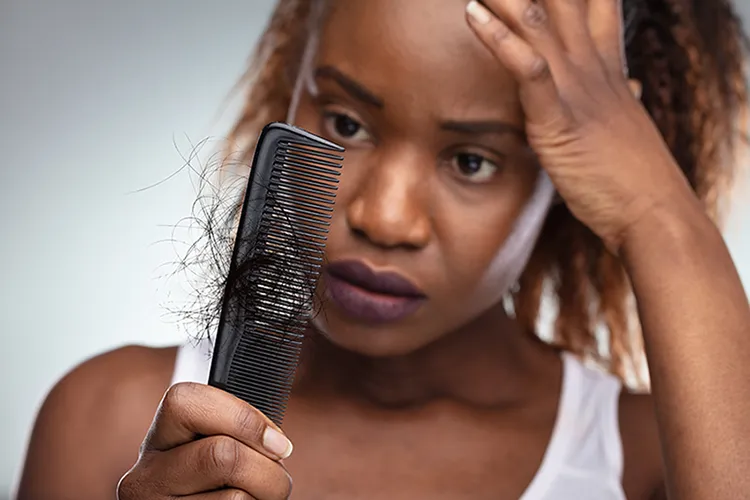Hair loss matters
Like many women, you may see your hair as an important part of who you are. You may associate it with how the world sees you or how good you feel. Losing your hair – or changes to how your hair looks and feels – as a side effect of cancer treatment can take away those feelings. It can also make your cancer diagnosis public, opening you up to conversations you might not want, or be ready for.1,2,3
Will I definitely lose my hair after cancer treatment?
Some breast cancer treatments increase your chance of hair loss more than others. For example, between 6 and 7 women out of every 10 receiving chemotherapy experience full hair loss.4 But not all types of chemotherapy cause hair loss.3
Radiotherapy, targeted therapies, immunotherapies and hormone therapies may also affect hair growth. They may cause hair to fall out either completely or in certain places, or they may slow down growth or cause it to get thinner.3
Hair loss not only depends on which treatment you have, but also:5
- The amount (dose) of treatment
- How your body reacts to the treatment
- How long you have treatment for
Hair loss can affect any hair on your head and body. This includes eyelashes and eyebrows, pubic hair, and underarm hair.1,3
Hair loss is not the only possible hair-related side effect of breast cancer treatment. Changes in hair quality, texture, thickness, colour and growth pattern can also be seen. For example, you may see that your hair is softer, curlier or a different colour.3 With some treatments, the scalp may become more sensitive, and your hair may become delicate and difficult to style.4
If hair loss is a possibility for you, your healthcare team should talk to you about this before you start your treatment.
Is there any way to prevent hair loss?
For people having certain types of chemotherapy, a scalp cooling system, such as a cool cap, may be recommended during treatment to prevent hair loss. This works by reducing blood flow to the scalp to prevent the chemotherapy drug from getting into the hair follicles and reduce the risk of hair loss.1,3
What can I do to prepare myself for hair loss?
Coping with hair loss is a very personal journey. Whether you choose to use wigs, scarves, hats, or caps, or embrace a bald head, you will likely have your own preference on how to handle it. Here are some ways to prepare for hair loss: 1,3
- Talk about getting a wig before you lose your hair so you are prepared and in control for your hair loss; you might even want to try a new style or colour
- Think about whether you prefer to gradually cut your hair short before your treatment starts to help you get used to seeing yourself with less hair
- Think about whether you prefer to shave off your hair (if you do, use an electric razor to avoid cutting the skin)
- Wear a hair net at night to avoid waking up and seeing the upsetting sight of hair all over your pillow
- Some women choose to shave their heads when their hair starts falling out; others prefer to wear a cap, scarf or turban.
What are some of the things I can do to care for my hair and scalp during cancer treatment?7,8
- Comb your hair gently with a wide toothed comb
- Wash your hair with warm water and shampoo specifically for sensitive scalps, with mild detergents, no fragrances and soothing ingredients
- Limit washing your hair – try not to wash your hair more than twice a week or less than once every ten days
- Use gentle conditioners and moisturising balms that hydrate the hair and keep the scalp moisturised
- Let your hair air dry naturally or blow-dry with cool air using a hair dryer
- Protect your hair and scalp from the sun by applying sunscreen and wearing hats and scarves when outdoors
- If you decide to shave your head when you start to lose your hair, your scalp may feel sore and irritated – apply emollients and sun protection
What are some of the things I should avoid when caring for my hair and scalp during cancer treatment?8,9
- Don’t pull the hair
- Avoid using hairpins and clips that pull on weakened hair
- Avoid using heat on the hair (for example, hair dryers on hot mode, hair straighteners or curling irons; having it styled with heat, such as a perm)
- Avoid hair dye as much as possible (if you do dye your hair, look for organic dye with plant-based ingredients)
- Avoid applying glue on hair prostheses to avoid irritation or injury
We hope some of these tips help you prepare for, and cope with, changes to your hair after cancer treatment. Be sure to speak to your medical team if you have any questions or concerns regarding hair changes. They will be able to offer support specific to your situation.
References
- Breast Cancer Network Australia. Hair loss. Available at: https://www.bcna.org.au/resource-hub/articles/hair-loss/ [Accessed June 2025].
- Boland V, et al. The physical, psychological and social experiences of alopecia among women receiving chemotherapy: An integrative literature review. Eur J Oncol Nurs 2020:49:101840.
- CRUK. Hair loss, hair thinning and cancer drugs. Available at: https://www.cancerresearchuk.org/about-cancer/treatment/cancer-drugs/side-effects/hair-loss-and-thinning [Accessed June 2025].
- González AF, et al. Beyond cancer treatment: dermo-aesthetic and other wellness recommendations for breast cancer patients. Clin Transl Oncol 2024;27:909-934.
- Macmillan. Hair loss during treatment. Available from: https://www.macmillan.org.uk/cancer-information-and-support/impacts-of-cancer/hair-loss/hair-loss-during-treatment [Accessed June 2025].
- Macmillan. Scalp cooling. Available from: https://www.macmillan.org.uk/cancer-information-and-support/impacts-of-cancer/hair-loss/scalp-cooling [Accessed June 2025].
- Mayo Clinic. Chemotherapy and hair loss: What to expect during treatment. Available from: https://www.mayoclinic.org/tests-procedures/chemotherapy/in-depth/hair-loss/art-20046920 [Accessed June 2025].
- Breast Cancer Now. Looking after your hair during breast cancer treatment. Available from: https://breastcancernow.org/about-breast-cancer/treatment/chemotherapy/chemotherapy-side-effects/breast-cancer-and-hair-loss#5-looking-after-your-hair-during-breast-cancer-treatment [Accessed June 2025].
- Cancer Research UK. Coping with hair loss. Available from: https://www.cancerresearchuk.org/about-cancer/coping/physically/changes-appearance/hair-loss/coping [Accessed June 2025].


